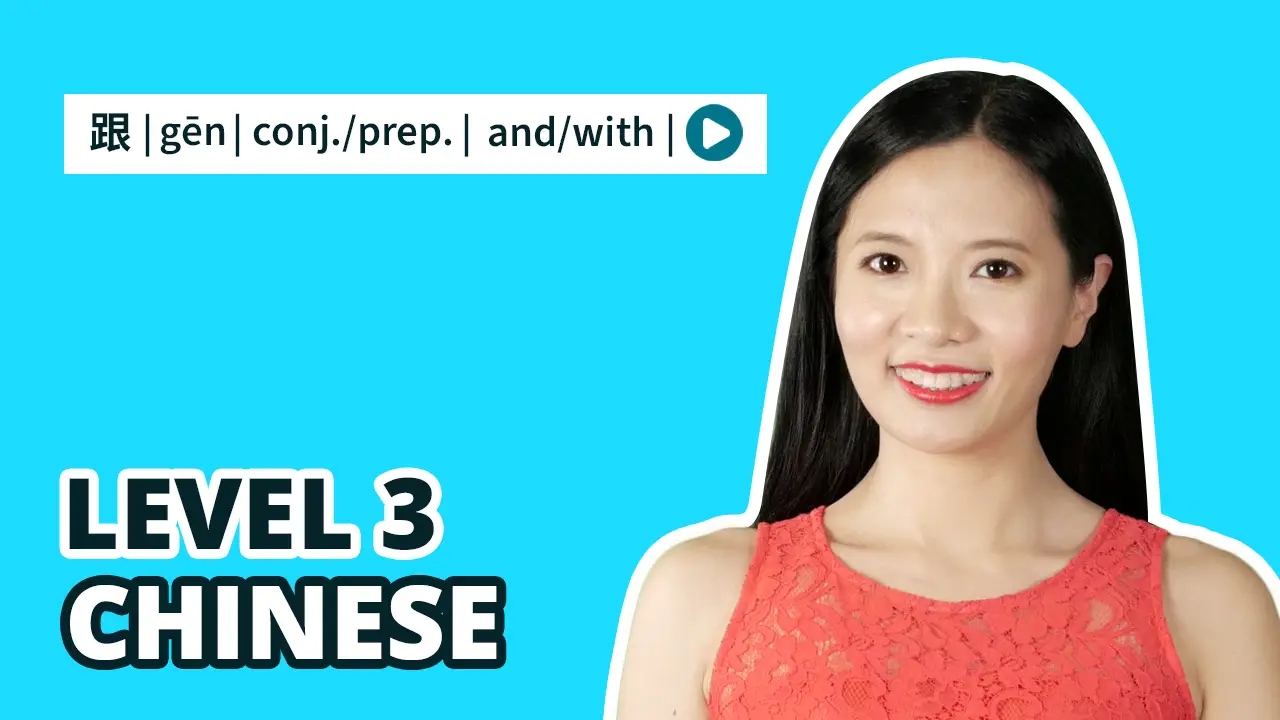Level 3 Lesson 24.1 – 黄 蓝 绿 泡 段 对话 先 再 然后 最后
HSK 3+ VOCABULARY: 黄 蓝 绿 泡 段 对话 先 再 然后 最后
In this video lesson we'll learn the vocabulary in Lesson 24 and practice them with a lot of example sentences. For new Chinese characters, we'll learn how to write them and know about their structures and origins in the attached writing sheet.
- VOCABULARY: 黄 蓝 绿 泡 段 对话 先 再 然后 最后
- CHINESE CHARACTERS: 黄 蓝 绿 泡 段
VOCABULARY LIST
VOCABULARY USAGE
1. 黄 huáng · NEW HSK 3 / NEW HSK 6
adj. 形容词 xíngróngcí ▸ yellow; of the color yellow
2. 蓝 lán · OLD HSK 3 / NEW HSK 3
adj. 形容词 xíngróngcí ▸ blue; of the color blue
3. 绿 lǜ · OLD HSK 3 / NEW HSK 4
adj. 形容词 xíngróngcí ▸ green; of the color green
- huáng sè de kùzi
huáng kùzi
黄色的裤子
黄裤子
yellow pants - lán sè de qúnzi
lán qúnzi
蓝色的裙子
蓝裙子
blue skirt/dress - lǜ sè de xiézi
lǜ xiézi
绿色的鞋子
绿鞋子
green shoes
4. 泡 pào · OLD HSK - / NEW HSK 6
v. 动词 dòngcí ▸ to soak
- pào chá
泡茶
to “make” tea
- xǐzǎo
pàozǎo
洗澡
泡澡
to wash-shower/bath; to take a shower/bath
to soak-bath; to take a bath
5. 段 duàn · OLD HSK 3 / NEW HSK 3
m.w. 量词 liàngcí ▸ [used for parts, pieces or sections of the whole]
section; piece; part; division
- yí duàn yīnyuè
一段音乐
one “piece”/“clip” (of) music - yí duàn shìpín
一段视频
one “clip” (of) video - yí duàn lù
一段路
one “section” (of) road/(journey) - zhè duàn huà
这段话
this “piece” (of) speech(/paragraph)
6. 对话 duìhuà · OLD HSK 6 / NEW HSK 3
(1) n. 名词 míngcí ▸ dialogue; conversation
- yí duàn duìhuà
zhè duàn duìhuà
一段对话
这段对话
one “piece” (of) dialogue
this “piece” (of) dialogue
- Xué Zhōngwén de shíhou wǒmen jīngcháng liànxí duìhuà.
学中文的时候我们经常练习对话。
(At the) time (when) learning Chinese we often practice dialogues. - Zhè bù diànyǐng li de duìhuà hěn shǎo.
这部电影里的对话很少。
(The) dialogues (in) this “bu” (of) movie-inside (are) very few.
(2) v. 动词 dòngcí ▸ to have a dialogue; to have a conversation
- Nǐ xué le nàme jiǔ Zhōngwén, xiànzài néng gēn Zhōngguó rén duìhuà le ma?
你学了那么久中文,现在能跟中国人对话了吗?
You (have) learned (for) that long Chinese, now can (you) do-conversations with Chinese people (already)?
7. 先 xiān · OLD HSK 3 / NEW HSK 3
adv. of Time 时间副词 shíjiānfùcí ▸ to indicate that an action/event occurs
earlier, at first, or in advance
- Nǐ xiān yòng cèsuǒ ba!
你先用厕所吧!
You (can) use (the) restroom first! - Wǒ měi tiān zǎoshang qǐchuáng yǐhòu dōu huì xiān gěi zìjǐ pào yì bēi chá.
我每天早上起床以后都会先给自己泡一杯茶。
(In the) time (that is) after I get-up-(from)-bed every day morning (I) all would make one cup (of) tea for (my)self first.
8. 再 zài · OLD HSK 2 / NEW HSK 1
(1) adv. of Time 时间副词 shíjiānfùcí ▸ to indicate that an action/event occurs after the previous action/event finishes
- Nǐ zài xiǎng yí xià ba, juédìng le zài gàosu wǒ.
你再想一下吧,决定了再告诉我。
You again think (about it) (for) “a little bit”, (after you) decide (and) then tell me. - Fàng le yán děng wǔ fēnzhōng zài fàng táng.
放了盐等五分钟再放糖。
(After) putting-in salt wait (for) 5 minutes (and) then put-in sugar.
(2) adv. of Frequency 频率副词 pínlǜfùcí ▸ again; once more
9. 然后 ránhòu · OLD HSK 3 / NEW HSK 3
conj. 连词 liáncí ▸ to connect two actions/events that occur one after another
- Wǒ xiǎng le yí xià, ránhòu juédìng bù bǎ zhè jiàn shì gàosu tā.
我想了一下,然后决定不把这件事告诉他。
I thought (about it) “really quick”, (and) after-that decided to not “ba{indicating the handling of}” this “jian” (of) thing tell him. - Tā hē le diǎnr píjiǔ, ránhòu shuì zháo le.
他喝了点儿啤酒,然后睡着了。
He drank “a little bit” (of) beer, (and) after-that fell-asleep.
10. 最后 zuìhòu · OLD HSK 6 / NEW HSK 3
(1) n. 名词 míngcí ▸ the last one
- zuìhòu de xīwàng
最后的希望
the last hope - wǔ yuè de zuìhòu yì tiān
五月的最后一天
the last day (of) May - Zhè duàn duìhuà de zuìhòu yí jù shì shéi shuō de?
这段对话的最后一句是谁说的?
Who was (it that) said the-last one sentence (of) this “piece” (of) dialogue?
(2) n. 名词 míngcí ▸ (in) the end [indicating an action/event occurs last]
- Zuìhòu, wǒ bǎ juédìng gàosu le dàjiā.
最后,我把决定告诉了大家。
(In the) end, I “ba{indicating the handling of}” the decision told everyone. - Tāmen zuìhòu fēnshǒu le, méi yǒu jiéhūn.
他们最后分手了,没有结婚。
They (in the) end broke-up, (did) not get-married.
